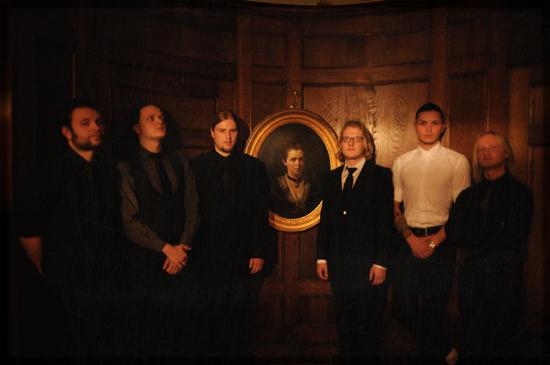From the vaudevillian theatrics of Kind Diamond, to the Copenhagen sweep-picks of Mercyful Fate, the Dansk arm of the Scandinavian metal scene has always had a large propensity for schlock-horror. Kellermensch, from Esbjerg on Denmark’s west coast, offer a skewed take on their homeland’s sound, citing influences as diverse as Tom Waits, Einstürzende Neubauten and Black Flag.
Upon closer inspection of the sextet’s lovingly crafted eponymous debut, you can hear the thematic disparity – no more so than in the refreshing re-imagining of Neil Young’s Don’t Let it Bring You Down. Kellermensch is as much an ode to the band’s love of pop songcraft as storm sprayed tonal bestiality, striking balance, rather than compromise, between the two.
Typically seen adorning buttoned waistcoats, tailored shirts and sporting a well-manned orchestra onstage, the band also claim to be heavily influenced by the Die Brücke German expressionist movement from the early 1900s and the proto-existentialism of Fyodor Dostoyevsky’s Notes from the Underground.
“Lyrically, we wanted to step away from the confident and hero-ish attitudes that many rock and metal acts possess,” concedes Sebastian Wolff, Kellermensch’s co-guitarist, vocalist, and founding member. “Dostoyevsky’s protagonist is constantly battling feelings of inferiority and has trouble living up to the standards set by society – these are themes that we all identify closely with. We wanted to make a record filled with doubt and insecurity.” Their moniker, the Germanic translation of the 1864 novella, became a fitting ode to the emotionally paradoxical landscapes clearly on display in the music.
“Die Brücke, and other expressionistic painters inspired our work in attempting to create music that was both dark and heavy without the mechanical tightness and precision of bands like Tool and Neurosis. The expressionists were masters at creating their art at a sporadic pace and still being able to express dark and subtle emotions – I have always admired them for that. Not relying on precision when playing and writing was pretty difficult, and Die Brücke and Edvard Munch became both an inspiration and comfort for us.”
After forming in 2006 on the back of various unsuccessful constellations, Wolff and old school friends Christian Sindermann and Anders Trans joined up with brothers Jan and John Laursen and Claudio Suez. It soon after became apparent that Kellermensch’s musical outlook was matched only by their idiosyncratic approach to recording. In turn, this presented the band with difficult obstacles to overcome, resulting in a rejection of initial album recordings in Copenhagen.
“We have always had very specific wishes: we wanted to record it partly live, and partly onto analogue tape. We just wanted to create a natural and organic sound and to minimalise the editing process. We booked a studio in Copenhagen that could accommodate our wishes, but unfortunately we had problems with the studio’s acoustics. Although we tried a lot of things, we ended up with 10 tracks that just didn’t sound right and went home disappointed. Shortly afterwards we realised that we’d have to record the album ourselves, so we bought some equipment, and began looking around Esbjerg for locations with the right acoustics for our drum recordings. It was a lot of trouble, but we got the sound that we wanted in the end.” The immediate environment and its surroundings are clearly a powerful motif for the thoughtful collective, both practically and intellectually. Kellermensch, which was nominated for a contextually prestigious Danish Metal Award, is littered with escapist lyrics: ‘This town is like a wound that won’t heal’ Wolff horses in Moribund Town.
But it’s not a great surprise that the band feel so disillusioned with a scene seemingly transfixed with tired genre clichés and watered-down Hammer Horror aesthetics. “When we started out, we felt very much like outsiders. We didn’t feel any connection to other bands in Denmark, and we had no desire to associate ourselves with it. We spent all of our energy trying to create something that wasn’t part of a scene or movement. I think we have kindred spirits in the acts we consider our inspirations, but we don’t fraternise with them. After the release of the album, a few successful Danish acts showed their support and we do owe them our gratitude: to play in front of huge audiences because larger bands thought we deserved the exposure was a very helpful, encouraging thing.”
One gets the feeling that the desire to distance themselves from the area’s stigma has become as much a curse as a blessing, especially in a commercial sense. “When the album came out, I think people had a hard time figuring out what to do with our music, and how to describe and categorise it – it is difficult for the media to handle it, but I hope that we will eventually find a place in the landscape…maybe we already have.” That the music on their inaugural long-player isn’t obviously abstract is perhaps testament to the stagnation of the Danish metal scene rather than a self-delusion, and this alone should be cause for celebration. “Where you live works as a backdrop against which you can set up themes in your music. Our music sort of drags along at a steady pace and is contemplative and I think somehow it is influenced by the town it comes from.”
Where could a band so uniquely focussed move to next? The answer lies in the album’s devil in the details moments, where Wolff and co’s propensity for off-piste leftism is occasionally indulged. “We pride ourselves in being willing to experiment. That’s what Kellermensch is all about.” Volbeat, The Psyke Project, and Royal Hunt: please take note.
Kellermensch’s Myspace Page


